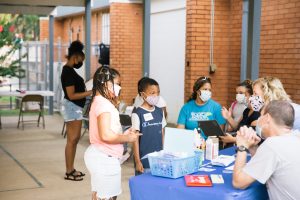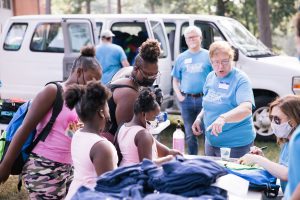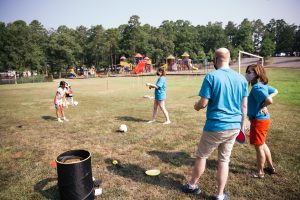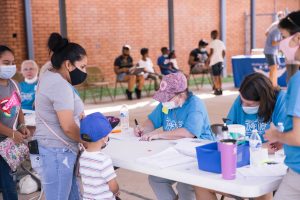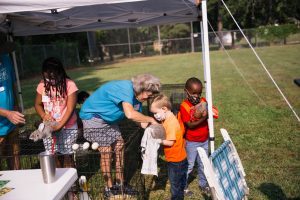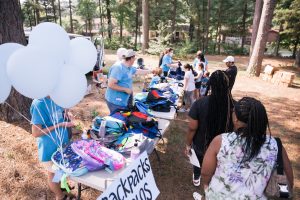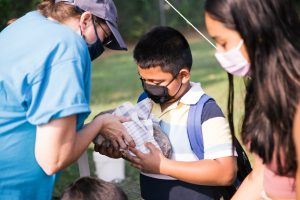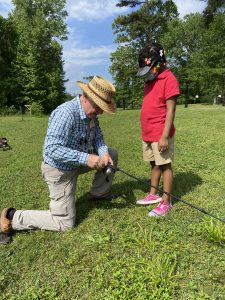The Wordless Gospel: An Outreach to a Public School
AMIA Communications
It was intentional from the beginning. As the congregation began to pray for and look toward the ideal location for their new church building, they specifically sought out an area where community outreach would be natural, nearby and significant. Their desire was to be a mission to the area.
That’s how St. Andrew’s Church of Little Rock first discovered Wilson Elementary School in their neighborhood. St. Andrew’s was able to partner with the faculty and families of this under-resourced school, attended primarily by children from low-income families, from 2006-18. When Wilson School was closed by the district, the church once again prayed for direction; and as a result, followed most of the children and many of the teachers to Western Hills School, which was also nearby.
According to Mary Carole Smith, school outreach team leader and former chair of the missions team, “The most important part of our partnership with the school is the relationships we have formed with the principle and teachers, so they know we are reliable.” Because of those ties, those from the congregation who participate with the school are able to, “preach the gospel without words by loving on those kids, by going to field days and helping with field trips,” she explains. “There is very little parental involvement, so there is a need with children that young to have extra helping hands.”
The church also puts on a back-to-school festival each August where they supply families with backpacks, school supplies and school uniforms. They have a carnival of fun during the festival, which helps to begin to establish rapport with the families and children. St. Andrew’s also holds a “Christmas Blessing” party at the church each year for students, families and faculty. Gifts of warm clothing are given to the families. “We can preach the gospel with words then, since it is held at the church,” says Mary Carole.
Some church members form a team called “Western Hills Friends” that goes to the school weekly to spend time with the children who need a little extra love. Mary Carole explains, “They help with homework and talk about whatever the kid wants to talk about. It often improves the behavior and grades of the students involved.”
The benefits of the church’s partnership with the school was captured in a recent text from one of the teachers:
I wanted to say one more time, we appreciate you all SO MUCH. In a world where everyone is divided and so many people have too much to say and never act, the Saint Andrew’s congregation renews faith and hope in “church” and certainly in Jesus, not with their voices but with their actions. I haven’t met a single person from SA [Saint Andrew’s] that doesn’t walk the walk and that is exactly what the world needs. We are beyond blessed to have y’all as a partner!!!!
The ministry also benefits those in the congregation who participate. With the larger events, members rally around a common activity and build relationships with each other that would not necessarily happen otherwise. The group is usually from a cross-section of the parish (young families, seniors, high schoolers, those who attend various services, etc.) who don’t have other natural ways to connect. “There is a lot of church bonding that happens. But also, it is one the most joyful days we have in the congregation because service just naturally brings joy,” Mary Carole explains. “It is easy to love up on those kids and represent Jesus because it is such a joy to do.”
About 30 people from the congregation help routinely with weekly visits, field trips and other activities. “Probably a third of the church participates in one of the two larger events,” according to Mary Carole. The outreach to Western Hills School is the largest mission program of St. Andrew’s, with about 20% of the mission budget allocated to it.
After many years of leading the school outreach, Mary Carole gives these “first step” suggestions for other congregations wanting to have an outreach to a local school:
- Pray, including “Should we do it or not?” and “Which school should we pick up if we do it?”
- Build relationships with administration and teachers.
- Don’t be a group that just throws money or supplies. Show up. Engage.
- Be faithful, consistent and reliable.
- Have careful and clear communication.
- Don’t be needy; don’t request anything of the school (e.g., thank-you letters from the students, statements from faculty).
To find out more about starting a program, contact Mary Carole at mc.young@mrmblaw.com.

